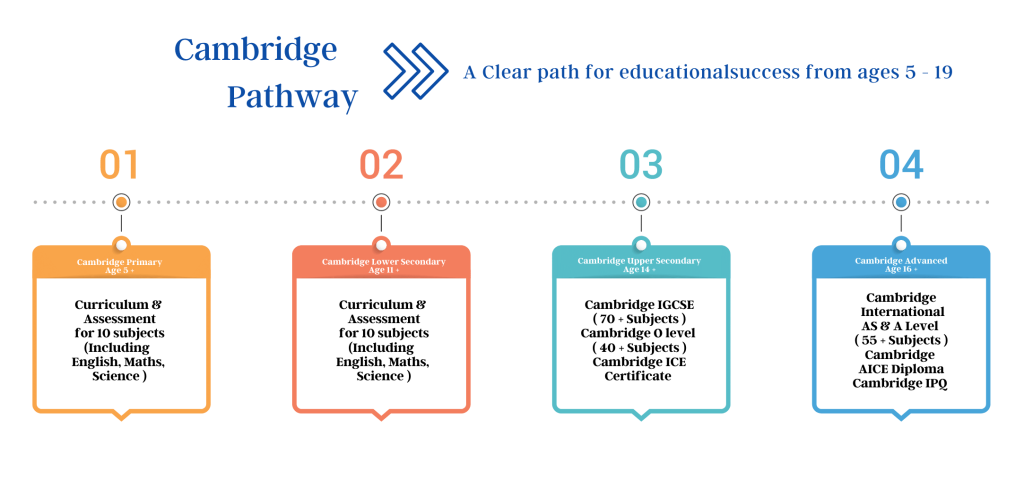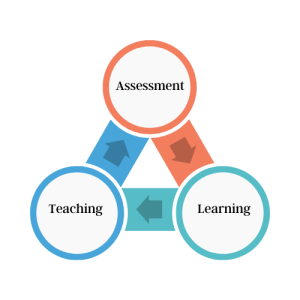

The International Cambridge Curriculum is recognized by universities worldwide and employers around the world as a standard in education. It is international, flexible, challenging, and inspiring. Cambridge students are able to develop a curiosity and a passion for learning. They acquire the skills necessary to succeed at university and in their future career.
The Cambridge Pathway: From primary through to pre-university
The Cambridge Pathway gives students a clear path for educational success from age 5 to 19. Students on the Cambridge Pathway have the opportunity to gain the skills and knowledge they need to succeed at school, university, and beyond. These four stages take you seamlessly from primary ,Secondary into the pre-university years. Each stage- Cambridge Primary , Cambridge Lower Secondary, Cambridge Upper Secondary, Cambridge Advanced builds on the learning of the previous years.

Cambridge Pathway for TBA Students
At TBA, we implement the world-class Cambridge International Curriculum from the Pre-primary section to Grade 12. We offer Cambridge Checkpoints, IGCSEs (exams at the end of Grade 10) and AS & A Levels (exams at the end of Grades 11 & 12).
Understanding, knowledge and higher-order thinking skills
Cambridge programmes combine a focus on deep subject knowledge with the ability to develop skills for future study and work. It is a place that values both deep subject knowledge and conceptual understanding, which helps students to make connections between different aspects of a subject. Students are encouraged to learn higher-order thinking skills, such as problem solving, critical thinking and collaboration, as well as the ability to present arguments. These skills are transferable and will be useful for a lifetime. They also prepare students for their future. These skills make learning fun and rewarding.
Cambridge Global Perspectives
Cambridge Global Perspectives is a transformative programme for students in all stages of school education that develops outstanding transferable skills such as critical thinking, collaboration, and research. This programme is offered to students at TBA from grade 3 onwards and helps them to evaluate data, analyse the same ,think logically and present the same. Students use these constructively in all areas of their life.
Flexibility and choice for students and schools
Cambridge schools adapt the Cambridge International Curriculum to fit their culture, ethos and students’ needs. Students can choose the subjects they are truly passionate about and specialise in them from Grade 9 onwards. By offering all stages of Cambridge curriculum, we provide consistency of teaching and learning approaches and a seamless progression from one stage to the other.
Learning and Teaching
We believe that our teachers are our strongest asset and we are fully committed to investing in their lifelong learning. We develop a systematic annual plan for Continuous Professional Development and our teachers participate in Cambridge training events, workshops by experts in diverse areas, self-study courses, online conferences and webinars round the year.
Assessment
Assessment plays two crucial roles:
1. To prove that a student has learned.
2. To improve the understanding and skills of students.
Assessments at TBA are geared towards helping identify a student’s strengths and to identify areas of improvement thus providing much needed support. We conduct continuous, comprehensive unannounced assessments focussed on support in the primary section providing a stress-free environment .
1. To prove that a student has learned.
2. To improve the understanding and skills of students.
Assessments at TBA are geared towards helping identify a student’s strengths and to identify areas of improvement thus providing much needed support. We conduct continuous, comprehensive unannounced assessments focussed on support in the primary section providing a stress-free environment .

Students are offered the opportunity to attempt the Cambridge Checkpoint in Grade 5 and gRade 8. TBA students are exposed to the Cambridge pattern of assessment from grade 6 onwards.
Students orient to the IGCSE exams in grade 9,10 and attempt the A levels (Grade 11, 12) thereafter. Every Cambridge exam gives a true picture about a student’s abilities, regardless of where and when they were taken. The assessments are a global passport to further education and employment.
International recognition
The Cambridge qualifications that students have earned are recognized worldwide and accepted by employers and universities at home as well as abroad; they have a strong reputation and will remain valuable for life.
Recognition of employer and university
More than 2100 colleges and universities around the world recognize Cambridge qualifications. They are recognized by all UK universities, more than 800 US universities (including all Ivy League schools), and many other important student destinations such as Canada, Australia and South Africa. Our qualifications are recognized by employers and universities as proof of academic achievement. They know that our curriculum and rigorous assessments provide students with the tools they need to succeed in higher education.
Global community

Over a million students in more than 10,000 schools
Cambridge schools are part of a global network. Nearly a million students are taught Cambridge qualifications and programmes in more than 10,000 schools across 160 countries. The Cambridge board supports teachers and schools to achieve the best results for students. Schools provide invaluable feedback from many perspectives, including principal, teacher, student, and parent, to ensure that Cambridge qualifications are relevant, world-class, respected, and recognized.
Student and professional learning communities
Teachers from Cambridge are connected. Teachers can share their views, information, and resources with each other through our professional learning communities, both online and face-to-face. Regular professional development events bring together teachers and experts, providing the opportunity to share knowledge and learn from each other.
